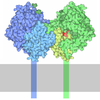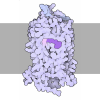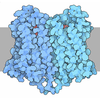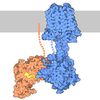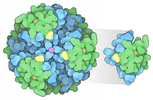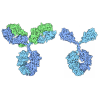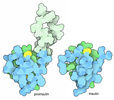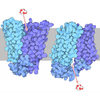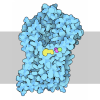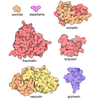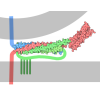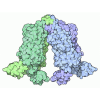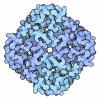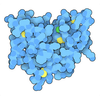登録情報 データベース : PDB / ID : 7rkmタイトル Structure of CX3CL1-US28-Gi-scFv16 in C-state (Guanine nucleotide-binding protein ...) x 3 Antibody fragment scFv16 Fractalkine G-protein coupled receptor homolog US28 キーワード / / / / 機能・相同性 分子機能 ドメイン・相同性 構成要素
/ / / / / / / / / / / / / / / / / / / / / / / / / / / / / / / / / / / / / / / / / / / / / / / / / / / / / / / / / / / / / / / / / / / / / / / / / / / / / / / / / / / / / / / / / / / / / / / / / / / / / / / / / / / / / / / / / / / / / / / / / / / / / / / / / / / / / / / / / / / / / / / / / / / / / / / / / / / / / / / / / / / / / / / 生物種 Homo sapiens (ヒト)Mus musculus (ハツカネズミ)手法 / / / 解像度 : 3.5 Å データ登録者 Tsutsumi, N. / Qu, Q. / Jude, K.M. / Skiniotis, G. / Garcia, K.C. 資金援助 組織 認可番号 国 National Institutes of Health/National Institute Of Allergy and Infectious Diseases (NIH/NIAID) R01AI125320 Howard Hughes Medical Institute (HHMI)
ジャーナル : Sci Adv / 年 : 2022タイトル : Atypical structural snapshots of human cytomegalovirus GPCR interactions with host G proteins著者 : Tsutsumi, N. / Maeda, S. / Qu, Q. / Voegele, M. / Jude, K.M. / Suomivuori, C.M. / Panova, O. / Waghray, D. / Kato, H.E. / Velasco, A. / Dror, R.O. / Skiniotis, G. / Kobilka, B.K. / Garcia, K.C. 履歴 登録 2021年7月22日 登録サイト / 処理サイト 改定 1.0 2022年1月26日 Provider / タイプ 改定 1.1 2024年10月23日 Group / Structure summaryカテゴリ chem_comp_atom / chem_comp_bond ... chem_comp_atom / chem_comp_bond / em_admin / pdbx_entry_details / pdbx_modification_feature Item / _pdbx_entry_details.has_protein_modification
すべて表示 表示を減らす
 データを開く
データを開く 基本情報
基本情報 要素
要素 キーワード
キーワード 機能・相同性情報
機能・相同性情報 Homo sapiens (ヒト)
Homo sapiens (ヒト)

 Human betaherpesvirus 5 (ヘルペスウイルス)
Human betaherpesvirus 5 (ヘルペスウイルス) データ登録者
データ登録者 米国, 2件
米国, 2件  引用
引用 ジャーナル: Sci Adv / 年: 2022
ジャーナル: Sci Adv / 年: 2022 構造の表示
構造の表示 ムービービューア
ムービービューア Molmil
Molmil Jmol/JSmol
Jmol/JSmol ダウンロードとリンク
ダウンロードとリンク ダウンロード
ダウンロード 7rkm.cif.gz
7rkm.cif.gz PDBx/mmCIF形式
PDBx/mmCIF形式 pdb7rkm.ent.gz
pdb7rkm.ent.gz PDB形式
PDB形式 7rkm.json.gz
7rkm.json.gz PDBx/mmJSON形式
PDBx/mmJSON形式 その他のダウンロード
その他のダウンロード 7rkm_validation.pdf.gz
7rkm_validation.pdf.gz wwPDB検証レポート
wwPDB検証レポート 7rkm_full_validation.pdf.gz
7rkm_full_validation.pdf.gz 7rkm_validation.xml.gz
7rkm_validation.xml.gz 7rkm_validation.cif.gz
7rkm_validation.cif.gz https://data.pdbj.org/pub/pdb/validation_reports/rk/7rkm
https://data.pdbj.org/pub/pdb/validation_reports/rk/7rkm ftp://data.pdbj.org/pub/pdb/validation_reports/rk/7rkm
ftp://data.pdbj.org/pub/pdb/validation_reports/rk/7rkm リンク
リンク 集合体
集合体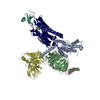
 要素
要素 Homo sapiens (ヒト) / 遺伝子: GNAI1 / 発現宿主:
Homo sapiens (ヒト) / 遺伝子: GNAI1 / 発現宿主:  Trichoplusia ni (イラクサキンウワバ) / 参照: UniProt: P63096
Trichoplusia ni (イラクサキンウワバ) / 参照: UniProt: P63096 Homo sapiens (ヒト) / 遺伝子: GNB1 / 発現宿主:
Homo sapiens (ヒト) / 遺伝子: GNB1 / 発現宿主:  Trichoplusia ni (イラクサキンウワバ) / 参照: UniProt: P62873
Trichoplusia ni (イラクサキンウワバ) / 参照: UniProt: P62873 Homo sapiens (ヒト) / 遺伝子: GNG2 / 発現宿主:
Homo sapiens (ヒト) / 遺伝子: GNG2 / 発現宿主:  Trichoplusia ni (イラクサキンウワバ) / 参照: UniProt: P59768
Trichoplusia ni (イラクサキンウワバ) / 参照: UniProt: P59768 Homo sapiens (ヒト) / 遺伝子: CX3CL1, FKN, NTT, SCYD1, A-152E5.2 / 発現宿主:
Homo sapiens (ヒト) / 遺伝子: CX3CL1, FKN, NTT, SCYD1, A-152E5.2 / 発現宿主:  Homo sapiens (ヒト) / 参照: UniProt: P78423
Homo sapiens (ヒト) / 参照: UniProt: P78423
 Human betaherpesvirus 5 (ヘルペスウイルス)
Human betaherpesvirus 5 (ヘルペスウイルス) Homo sapiens (ヒト) / 参照: UniProt: P69332
Homo sapiens (ヒト) / 参照: UniProt: P69332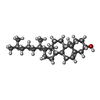


 Trichoplusia ni (イラクサキンウワバ)
Trichoplusia ni (イラクサキンウワバ) 試料調製
試料調製 電子顕微鏡撮影
電子顕微鏡撮影
 FIELD EMISSION GUN / 加速電圧: 300 kV / 照射モード: FLOOD BEAM
FIELD EMISSION GUN / 加速電圧: 300 kV / 照射モード: FLOOD BEAM 解析
解析 ムービー
ムービー コントローラー
コントローラー












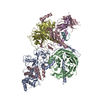
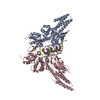
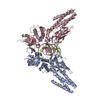
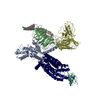
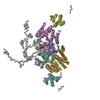
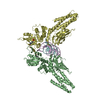
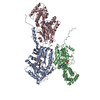
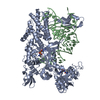
 PDBj
PDBj